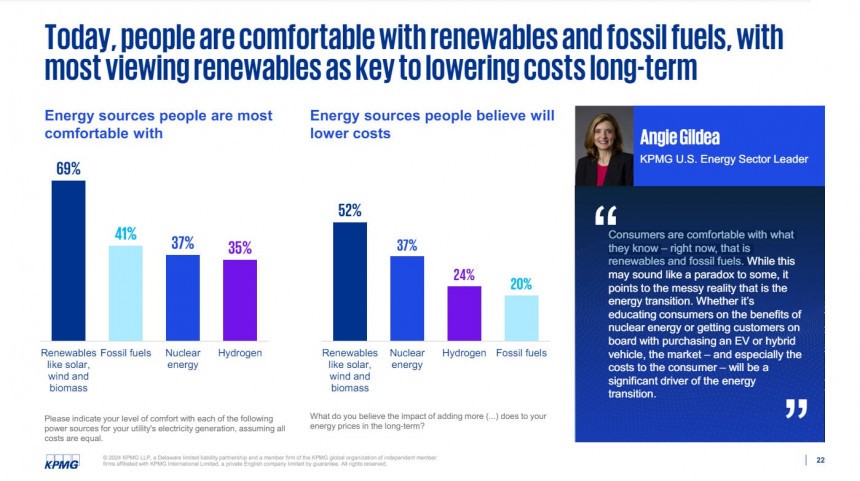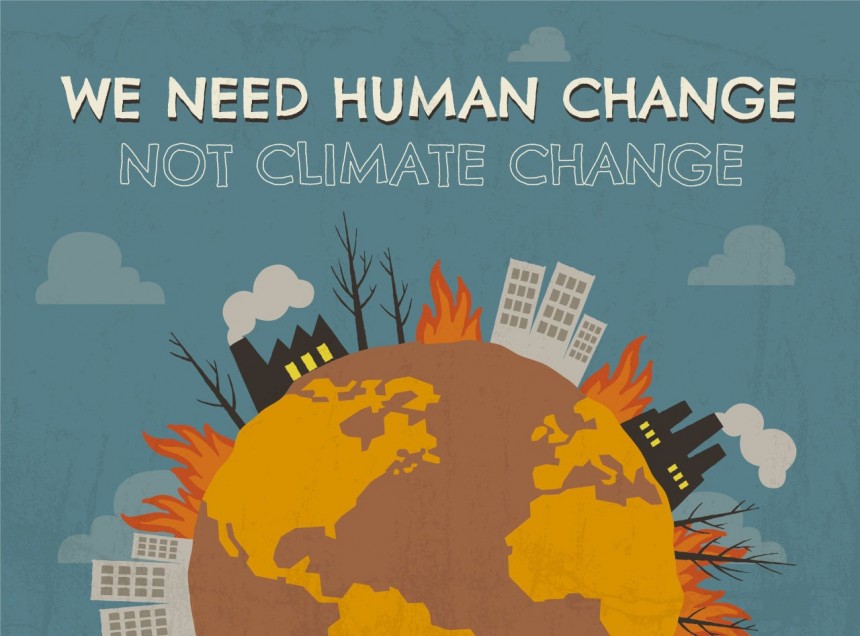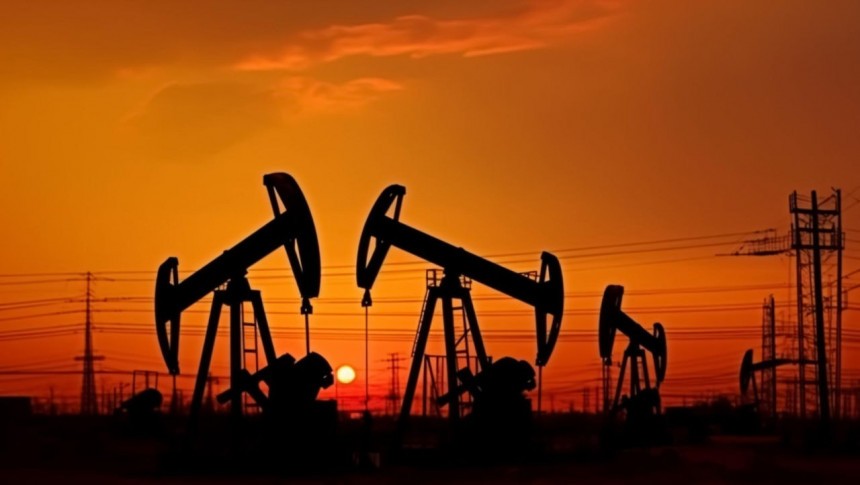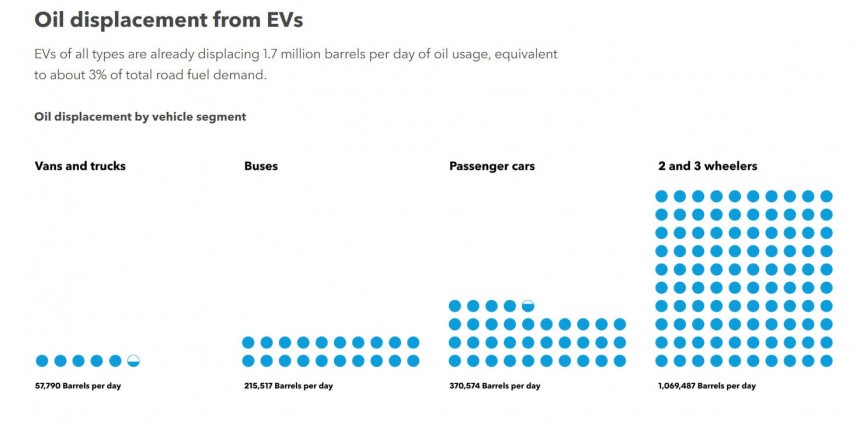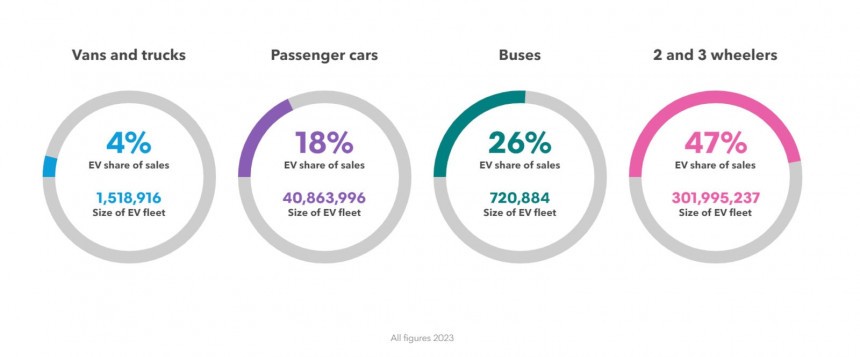In the first part of this editorial, we saw surveys highlighting Americans' increasing interest in hybrids and allegedly losing interest in electric vehicles. We also discussed why hybrids rapidly became the better alternative to gasoline counterparts. Now, it's time to explain why hybrids and plug-in hybrids actually pave the way to electric cars without ICE in the picture.
In the previous part, I subtly pointed out that hybridization is a problem for internal combustion engines. This may cause confusion: as the surveys clearly show that Americans favor hybrids over electric cars – and for very objective reasons – how do I dare to imply that ICE has no future?
Well, don't shoot the messenger because now, based on different sources and information, I'm going to give you the bigger picture of a very probable future without ICEs. At least I'll try to make an objective, compelling case, ignoring that I'm an electrohead.
All those memes and stories mocking environmentalists and electric cars did their job the same as modern anti-democracy propaganda led to the rise of extremists in almost any corner of the world. You'd be wrong to think there's no correlation between politics and companies in the fossil fuel or car industries.
Let's get back to KPMG's American Perspectives Survey because there are some slides related to the responders' position on energy sources. First of all, people are surprisingly most comfortable with… renewables: two-thirds of them, as opposed to less than a half for fossil fuels and, get this, only one-third for hydrogen.
As KPMG concludes, "Consumers are comfortable with what they know—right now, that is renewables and fossil fuels." While these two are "natural enemies," the picture they reveal is none other than that we're in the middle of transitioning from dirty to clean sources of energy. Mind you, every huge change has its hurdles.
In the meantime, in the aftermath of the COP28 Summit, the International Energy Agency thinks there's a good chance the world will triple renewables capacity by 2030. In 2023, there were 64% new additions compared to 2022. By the way, China recently connected the world's largest solar farm to its national grid, if anyone wonders who the leader of renewables is.
KPMG's survey reveals that people are not only comfortable with what they know, but half of them also believe that renewables will lower the overall energy cost. A third credit nuclear energy for that, and a quarter goes for hydrogen. Surprisingly, just 1 in 5 respondents supports the idea that fossil fuels could lower energy prices.
So, here's a trivia question: What state was the first in America to pass "an act relating to climate change cost recovery?" Sorry, it's not California. It's Vermont, whose authorities greenlighted a Climate Superfund Act seeking financial compensation from fossil fuel companies for the damage caused by climate change, which these companies largely cause.
California followed this example after the state's general attorney accused ExxonMobil, Chevron, Shell, and BP of "false advertising and deceptive marketing" because these companies misled the public and the authorities for decades regarding the harm of their products. They're also accused of "spreading misinformation and creating doubts about climate change."
Need I remind you that one of the presidential candidates—actually, the first former American president to be convicted of felony crimes—is also accused of approaching companies in the fossil fuels industry and promising to dismantle Biden's Administration's Inflation Reduction Act and other environmental laws if he becomes president in return for a billion-dollar contribution to his campaign?
Sure, for now, climate change denialism is less than 15% in the US, but it may spike if the wrong man becomes the 47th President of the United States. Either way, climate change will only become more prevalent, and people will be forced to look up (pun intended, please watch the "Don't Look Up!" movie again!) by the harsh reality.
The whole point of what I said above is that we're witnessing a shift in public awareness. I wonder when the majority of people will come to condemn ICE cars for spewing harmful pollutants into the air we breathe. Most young people already do, although popular wisdom sees them as ignorant and social media addicts.
United States is currently the biggest oil producer in the world, with 14-15 million barrels per day, followed by Saudi Arabia (the main member of OPEC) with around 12-13 mbd and Russia (subjected to international economic sanctions because of the war on Ukraine) with 11-12 mbd.
Together, the top 3 producers account for around 40% of global oil production. However, while the United States is also the biggest oil consumer (with around 19-20 barrels per day), it is followed by China, India, and Japan. This is where things get tricky.
China currently benefits from cheap oil from Russia because its aggressive neighbor has few options left, facing international sanctions. But, in the meantime, China's insane push for renewables and transport electrification will soon lead to a slowdown in crude oil consumption in China.
India also benefits from cheap Russian oil for now. Still, like China, it has bold objectives for decarbonization, so it's just a matter of time before it drastically reduces its oil consumption. On the other hand, Japan is pushing hard for a hydrogen-based economy, so its oil dependence is expected to end before 2060.
The forecast simply points out that the oil industry's investments of around 530 billion dollars in 2023 will most likely result in stranded assets. The oil price must keep going up for these investments to be profitable. That's why Russia and OPEC recently agreed to cut daily production so the price doesn't plummet.
But as the US increased its crude oil capacity for the sixth year in a row, oil prices hovered around $80 per barrel despite the wars in Ukraine and Gaza. Mind you, in May 2022, after Russia invaded Ukraine, oil prices spiked to more than $110 per barrel, leading to the energy crisis and economic inflation.
On the other hand, because of COVID-19, the price was below $20 per barrel in May 2020. However, the average for the last decade is between $70 and $80 per barrel. This is bad news for Big Oil because the investments declined in the same period compared to the previous decade.
Rystad Energy energy-consultancy company suggests that the oil industry's efficiency has improved these years, so that's why there's no need for more investments. However, EIA highlights that the expected demand increase in the following years is overestimated, mainly because of the transportation sector.
Two years ago, before the "EV market cooling down" was a thing, BloombergNEF forecasted that in 2025, 20 million plug-in vehicles (comprising cars, trucks, buses, and, very importantly, 2&3-wheelers) would lead to around 2.5 million barrels per day savings.
Well, today, there are over 42 million electric cars&LDVs out there, some 700,000 electric buses&trucks, and three hundred millions of electric 2&3-wheelers (one million of them were sold solely in India, in 2023!). BloombergNEF very conservative estimates are that "EVs of all types are already displacing 1.7 million barrels per day of oil usage."
This is roughly 3% of the total fuel demand. But get this: only 1 in 250 vehicles on the road today is electric – or around 2% of the global fleet. So, doubling the EV number will see a three-to-four-fold increase in oil savings. Of course, you'll say that this is not going to happen soon because of "the slower-than-expected demand" syntax, right? Wrong.
In 2023, almost 14 million new electric vehicles were sold worldwide, a 35% year-on-year increase. Meanwhile, in the first quarter of 2024, sales of EVs surged 20% compared to the same period in 2023, and in the first five months, their number topped 5 million. Even better, EIA expects 2024 sales to reach 17 million—a 20% increase from the previous year.
Now it's time for you to "Hold on, mate. Aren't EV sales slowing down?" Yes, they are, but this doesn't mean the sales plummet. The only thing decreasing is the rate at which the sales are growing. You should pay more attention to the alternative facts naysayers spread throughout the media and social media, okay?
For instance, the increase in the EU, EFTA & UK is only 4% in Jan-May 2024 (compared to 24% in Jan-May 2023), while the rise in the US & Canada is only 5%. We're yet to see a negative percentage Y-o-Y in these areas, but I'm sure China will counterbalance in the end (EV sales surged 30% in the first five months of 2024).
The real point is this: doubling today's EV number by 2030 means that in the following five and a half years, their sales must reach 40 million units. This means around 8 million units sold yearly, almost half the 2023 sales.
I doubt such a catastrophic scenario is possible, and I'll prove to you that I'm right in the third part of this editorial. Surprisingly, hybrids – promoted as the new kids on the block by the car industry – will only help EIA's forecasted oil glut become a reality. Stay tuned.
Well, don't shoot the messenger because now, based on different sources and information, I'm going to give you the bigger picture of a very probable future without ICEs. At least I'll try to make an objective, compelling case, ignoring that I'm an electrohead.
It's time not to ignore the elephant in the room: the pollution
The fact is that almost any debate around fossil fuels and internal combustion engines using oil-based fuels is a non-debate. How so? People generally tend to ignore the elephant in the room: the undeniable fact that humanity's contribution to global warming is massive.All those memes and stories mocking environmentalists and electric cars did their job the same as modern anti-democracy propaganda led to the rise of extremists in almost any corner of the world. You'd be wrong to think there's no correlation between politics and companies in the fossil fuel or car industries.
Let's get back to KPMG's American Perspectives Survey because there are some slides related to the responders' position on energy sources. First of all, people are surprisingly most comfortable with… renewables: two-thirds of them, as opposed to less than a half for fossil fuels and, get this, only one-third for hydrogen.
In the meantime, in the aftermath of the COP28 Summit, the International Energy Agency thinks there's a good chance the world will triple renewables capacity by 2030. In 2023, there were 64% new additions compared to 2022. By the way, China recently connected the world's largest solar farm to its national grid, if anyone wonders who the leader of renewables is.
KPMG's survey reveals that people are not only comfortable with what they know, but half of them also believe that renewables will lower the overall energy cost. A third credit nuclear energy for that, and a quarter goes for hydrogen. Surprisingly, just 1 in 5 respondents supports the idea that fossil fuels could lower energy prices.
Is climate change a hoax? No, not anymore
Hold on to that last idea for a minute because it means that more people understand the basic principle of the fossil fuel business: to increase prices gradually, hence Big Oil's profits. I will risk saying that more people have become aware of the hidden costs of fossil fuels' pollution—the harm to our health and the environment we depend upon.So, here's a trivia question: What state was the first in America to pass "an act relating to climate change cost recovery?" Sorry, it's not California. It's Vermont, whose authorities greenlighted a Climate Superfund Act seeking financial compensation from fossil fuel companies for the damage caused by climate change, which these companies largely cause.
California followed this example after the state's general attorney accused ExxonMobil, Chevron, Shell, and BP of "false advertising and deceptive marketing" because these companies misled the public and the authorities for decades regarding the harm of their products. They're also accused of "spreading misinformation and creating doubts about climate change."
Sure, for now, climate change denialism is less than 15% in the US, but it may spike if the wrong man becomes the 47th President of the United States. Either way, climate change will only become more prevalent, and people will be forced to look up (pun intended, please watch the "Don't Look Up!" movie again!) by the harsh reality.
The whole point of what I said above is that we're witnessing a shift in public awareness. I wonder when the majority of people will come to condemn ICE cars for spewing harmful pollutants into the air we breathe. Most young people already do, although popular wisdom sees them as ignorant and social media addicts.
The oil surplus is comin’!
Forgive me for sliding on the subjective environmentalist side; let me return to facts. The IEA predicts that we'll witness a "stunning oil glut" before the end of this decade, estimated at around 8 million barrels a day. This is 10% more than what the oil industry produces today, and while it doesn't seem much, it will catastrophically hurt the global economy.United States is currently the biggest oil producer in the world, with 14-15 million barrels per day, followed by Saudi Arabia (the main member of OPEC) with around 12-13 mbd and Russia (subjected to international economic sanctions because of the war on Ukraine) with 11-12 mbd.
Together, the top 3 producers account for around 40% of global oil production. However, while the United States is also the biggest oil consumer (with around 19-20 barrels per day), it is followed by China, India, and Japan. This is where things get tricky.
India also benefits from cheap Russian oil for now. Still, like China, it has bold objectives for decarbonization, so it's just a matter of time before it drastically reduces its oil consumption. On the other hand, Japan is pushing hard for a hydrogen-based economy, so its oil dependence is expected to end before 2060.
The forecast simply points out that the oil industry's investments of around 530 billion dollars in 2023 will most likely result in stranded assets. The oil price must keep going up for these investments to be profitable. That's why Russia and OPEC recently agreed to cut daily production so the price doesn't plummet.
But as the US increased its crude oil capacity for the sixth year in a row, oil prices hovered around $80 per barrel despite the wars in Ukraine and Gaza. Mind you, in May 2022, after Russia invaded Ukraine, oil prices spiked to more than $110 per barrel, leading to the energy crisis and economic inflation.
On the other hand, because of COVID-19, the price was below $20 per barrel in May 2020. However, the average for the last decade is between $70 and $80 per barrel. This is bad news for Big Oil because the investments declined in the same period compared to the previous decade.
Rystad Energy energy-consultancy company suggests that the oil industry's efficiency has improved these years, so that's why there's no need for more investments. However, EIA highlights that the expected demand increase in the following years is overestimated, mainly because of the transportation sector.
More EVs, less oil used. It's simply mathematics
Globally, two-thirds of the oil is used for cars, trucks, trains, airplanes, vessels, construction machinery, and so on. A fifth or so is used for petrochemicals, and the rest is used for energy purposes. Mind you, the internal combustion engines in the US use nearly 10% of all the oil in the world.Two years ago, before the "EV market cooling down" was a thing, BloombergNEF forecasted that in 2025, 20 million plug-in vehicles (comprising cars, trucks, buses, and, very importantly, 2&3-wheelers) would lead to around 2.5 million barrels per day savings.
This is roughly 3% of the total fuel demand. But get this: only 1 in 250 vehicles on the road today is electric – or around 2% of the global fleet. So, doubling the EV number will see a three-to-four-fold increase in oil savings. Of course, you'll say that this is not going to happen soon because of "the slower-than-expected demand" syntax, right? Wrong.
In 2023, almost 14 million new electric vehicles were sold worldwide, a 35% year-on-year increase. Meanwhile, in the first quarter of 2024, sales of EVs surged 20% compared to the same period in 2023, and in the first five months, their number topped 5 million. Even better, EIA expects 2024 sales to reach 17 million—a 20% increase from the previous year.
Now it's time for you to "Hold on, mate. Aren't EV sales slowing down?" Yes, they are, but this doesn't mean the sales plummet. The only thing decreasing is the rate at which the sales are growing. You should pay more attention to the alternative facts naysayers spread throughout the media and social media, okay?
For instance, the increase in the EU, EFTA & UK is only 4% in Jan-May 2024 (compared to 24% in Jan-May 2023), while the rise in the US & Canada is only 5%. We're yet to see a negative percentage Y-o-Y in these areas, but I'm sure China will counterbalance in the end (EV sales surged 30% in the first five months of 2024).
The real point is this: doubling today's EV number by 2030 means that in the following five and a half years, their sales must reach 40 million units. This means around 8 million units sold yearly, almost half the 2023 sales.






